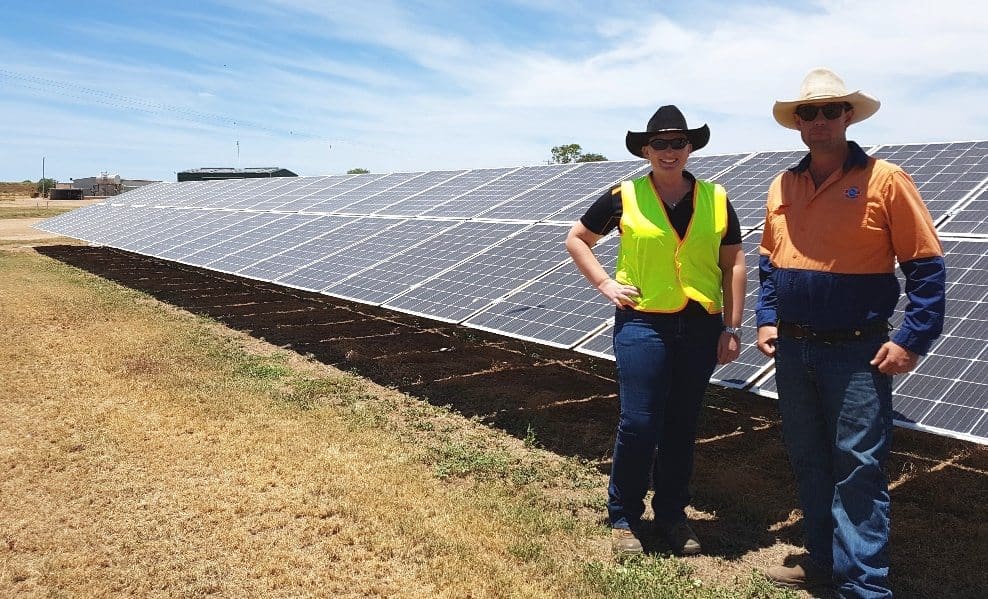
Teys Condamine feedlot manager Phillip Lambert and a staffmember in front of a small part of the yard’s 1034 panel solar array.
Results from a research project investigating solutions to reduce energy use and the environmental footprint of Australian feedlots will be presented in an online workshop later this month.
The Australian Lot Feeders Association will host the virtual workshop via Zoom on 24 March.
Teys Australia’s Condamine Feedlot in southern Queensland has hosted the 12-month project, using a Utility Management System installed across the site to monitor and measure water, gas and electricity use in real-time.
Smart Business Hub director Carl Duncan is leading the project, funded by MLA in consultation with ALFA.
“Feedlots are often at the fringe of grid locations where energy costs per unit are high – so having the right tools to better manage this business input cost is key,” Mr Duncan said.
Next-level innovations
The 30,000-head Teys Condamine feedlot had already reduced energy costs by 40pc and utility-related greenhouse gas emissions by 50pc before the project started, making it the ideal site to explore next-level innovations in energy and water management systems, he said.
“We cherry-picked strategic locations in the field for the energy meters, and have an IT system that sends data from the meters to the cloud, and into a software package that enables us run analytics to identify opportunities in real-time operations.”
“By having transparency over energy use in real-time with customised dashboards and alerting, the system is identifying opportunities to save energy and reduce the environmental footprint.”
Targeting thermal energy
After the first six months of the project, measurements showed thermal energy accounted for 86 percent of total energy usage. Much of this was related to steam-flaking used as part of the grain processing process.
“To monitor thermal energy, we’ve metered off fuel input going into the boiler and steam outputs so we can measure the efficiency of the thermal system, and that’s key because it’s usually the biggest area of opportunity in a feedlot where gains can be made,” Mr Duncan said.
Looking at water, the project is monitoring how much water the cattle are drinking; how much is evaporating from the turkey’s nest storage; and how much is used for dust suppression and process water for the steam-flaking plant and boiler.
For electricity, the project is using meters to measure locations like the mill plant and each of the mill plant motors, tub grinder, batching facility, workshops, and compressed air stations.
Reducing reliance on electricity
Teys Condamine feedlot general manager Phil Lambert said over the past four years the feedlot had implemented a range of measures including installing at 300-kilowatt solar system to mitigate energy usage (pictured top of page). Click here to read earlier story.
“We put a lot of effort into reducing our reliance on electricity particularly, and we’ve made some changes around gas and thermal heating. However, we really wanted to drill down further into the data to look at other opportunities to reduce energy use,” Mr Lambert said.
“The mill is our major energy user for gas for the boilers for steam for milling our grain and it’s also our largest user of electricity, with at least 80pc of our electricity usage coming from that area.”
Since the project started, it has highlighted opportunities for further efficiencies with the boilers to create steam for milling.
“If there has been a major change in the baseline, the system has obviously alerted us to that, so we can pick up an issue before there’s a spike in energy use and determine its cause,” Mr Lambert said.
Teys plans to continue to use the meters after the project has finished, so staff can use data to improve efficiencies in operations – whether that be benchmarking the energy costs associated with different grains, or the efficiency of particular operators.
Online workshop
The findings from the feedlot energy research will be shared during ALFA’s upcoming Exploring Feedlot Energy online workshop from Noon on 24 March. Speakers include Carl Duncan from Smart Energy Hub, Max Barnes from All Energy, and Rob Fowler, East Coast Steam.
Register for the workshop here.
